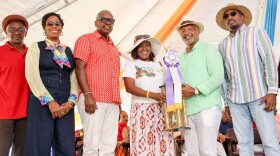ST. CROIX — Supervisor of Elections Caroline Fawkes recently responded to the Democratic Party of the Virgin Islands that her office cannot conduct primary elections without amendments to the Virgin Islands Code that are necessary following a federal court ruling declaring unconstitutional 10 elections laws.
“Unless the laws are amended, no primary will be held,” Fawkes said by phone, adding that it is up to the Legislature to act.
Democratic State Chair Stedmann Hodge Jr., in a letter to Fawkes dated last Thursday, outlined the party’s expectations for the Elections System of the Virgin Islands to hold a Democratic primary on August 3, but that the Democratic Party would certify the results.
During its quarterly meeting held virtually on May 18, the Democratic Party’s Territorial Committee approved the recommendations from an Ad Hoc Committee created to review the court’s ruling. Those recommendations included a stance by the Democratic Party that the Board of Elections must still conduct a primary, but that the party must certify the results.
In his letter, Hodge specifically referenced Title 18 of the Virgin Islands Code, Section 232 as it relates to the District Court opinion handed down January 10 by Chief Judge Robert Molloy in a civil lawsuit.
The Republican National Committee and Republican Party in the Virgin Islands won the lawsuit filed on August 2, 2022 against the Virgin Islands Board of Elections and the supervisor of elections.
READ MORE: “Litigants react to illegal election statutes, Senate discusses reform”
In addition to the second sentence in Section 232, the court found unconstitutional nine statutes in Title 18.
The court found that eight statutes in Title 18 [301(a), 303(a)-(c), 305, 306(a), 307, and 342], and the first sentence contained in section 304(a) — relating to when members of the territorial committee shall meet for organization — impermissibly infringe upon plaintiffs’ freedom of association guaranteed by the First Amendment by imposing severe burdens upon their internal party operations.
Section 232 has two sentences.
The first sentence, which remains law, requires that party primary elections be held in the Virgin Islands on the first Saturday of August for the purpose of choosing candidates for nomination to public offices to be voted for at the ensuing general election.
The second sentence, which the court deemed unconstitutional, gave the Board of Elections responsibility for certifying the process to be used by any political party to select party officers and candidates for public office. The court found the second sentence unconstitutional to the extent it allowed the BOE the right to reject a political party’s process used in selecting its officers and candidates for public office. The court found that the second sentence was not only unconstitutionally vague but violated constitutional due process by failing to provide a means of redress.
Hodge, in his letter to the supervisor of elections, pointed out that the court’s opinion did not state that the Board of Elections cannot conduct the primary elections of party officials or public officials. He wrote that the opinion stated that the board cannot certify or reject the process or results.

Fawkes, in a letter to Hodge dated last Friday in response to his letter, indicated that she is awaiting legislative action to clear up the “contradictory and problematic” sections of Title 18 before she can move forward with conducting the primary election, as per the first sentence in Section 232.
Fawkes wrote that the first sentence of Section 232 states that party primary elections shall be held in the Virgin Islands on the first Saturday of August for the purpose of choosing candidates for nomination to “public office” to be voted for at the ensuing general election. She clarified the public offices on the 2024 ballots are delegate to Congress, senator, at-large senator, Board of Elections, Board of Education, and at-large Board of Education, noting that all the offices will appear again on the general election ballot.
Considering the public offices on the 2024 ballots, Fawkes wrote that it clearly means all the Democratic aspirants who filed for political party offices are not in accordance with the first sentence of Section 232. She noted that the court’s opinion and order made it clear that the Elections System must not be involved in political party business, indicating it was one of the reasons why she told senators during a Committee of the Whole meeting on May 13 that her office would not be able to conduct primary elections unless amendments were made to the elections laws.
READ MORE: “ESVI: Government unable to conduct primary elections without changes to unconstitutional laws”
As Fawkes urges senators to amend the elections laws so her office would be able to conduct primary elections, she indicated in her letter to Hodge that her office will not support a split or hybrid process. Once her office is statutorily mandated to conduct the primary election, she wrote that it would perform the entire process.
Fawkes informed Hodge that the Board of Elections may weigh in on his letter as a separate entity, noting the BOE is planning an emergency meeting at 3 p.m. Thursday that will be held virtually via Microsoft Teams and in person in the ESVI conference room. The public is invited to attend in person at the ESVI offices on both St. Croix and St. Thomas.















